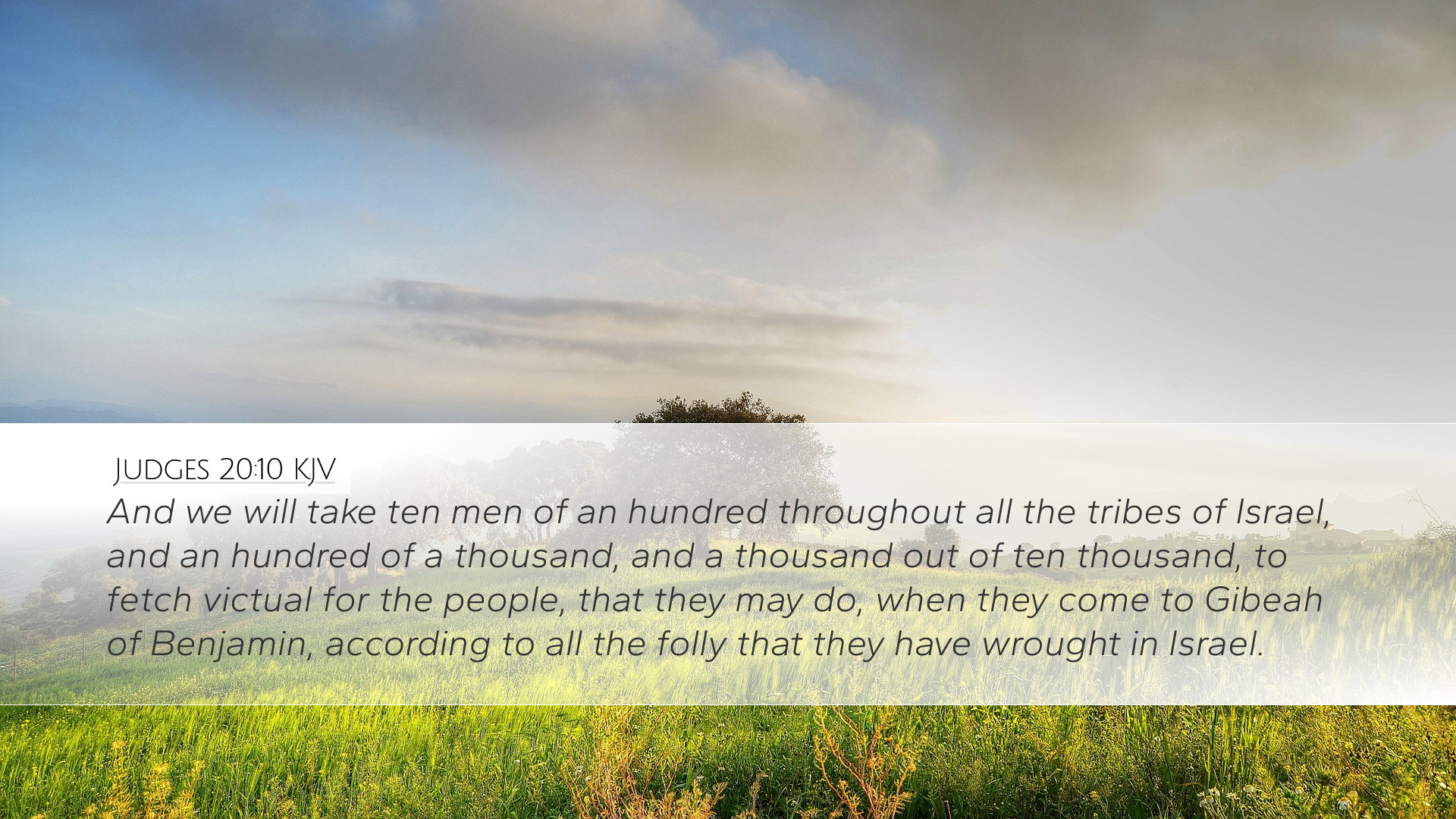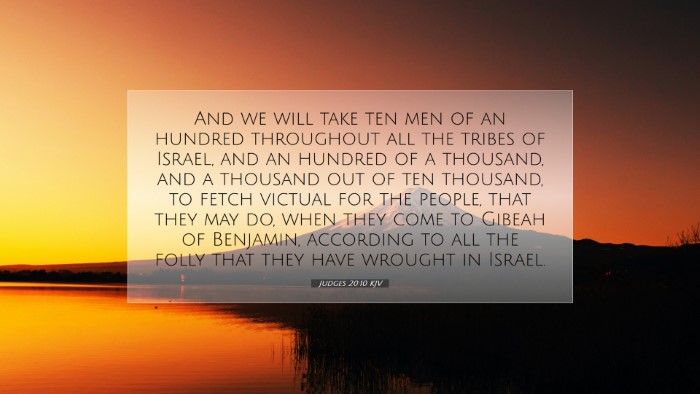Commentary on Judges 20:10
Bible Verse (Judges 20:10): "And we will take ten men of a hundred throughout all the tribes of Israel, and a hundred out of a thousand, and a thousand out of ten thousand, to fetch victuals for the people, that they may do, when they come to Gibeah of Benjamin, according to all the folly that they have wrought in Israel."
Introduction
This passage from Judges 20:10 stands at a significant juncture in the history of Israel, encapsulating themes of justice, collective action, and the dire consequences of sin. As the Israelites prepare to confront the tribe of Benjamin for the grievous sins committed at Gibeah, this verse highlights not only the organizational efforts of the people but also their commitment to rectifying injustice within their community. This commentary aims to provide an in-depth exploration of the insights related to this verse from various public domain commentaries.
Contextual Analysis
The Book of Judges depicts a tumultuous period in Israel's history characterized by moral decline and societal chaos. The events leading to the conflict with Benjamin are rooted in a horrific act of violence and injustice against a Levite and his concubine. The outcry against Gibeah represents a turning point as the tribes of Israel respond to the outcry for justice. The specifics in Judges 20:10 reveal the gravity of the situation and the preparedness of the Israelites to fulfill their duty.
Insights from Commentaries
Matthew Henry's Commentary
Henry emphasizes the organized nature of the Israelite response to injustice. He notes that the arrangement of ten men from each hundred and so forth indicates a serious and methodical plan of action. The calculation showcases the determination of the Israelites to gather resources for a significant military campaign against Gibeah. Henry asserts that the justice pursued by the Israelites serves as a divine principle, echoing the responsibility of nations to reply to atrocity with righteousness.
Albert Barnes' Notes on the Bible
Barnes elaborates on the logistical approach taken by Israel, highlighting the methodical arrangement of the people drawn from each tribe. The need for victuals indicates the impending conflict would require substantial preparation. He interprets this gathering as an essential verse demonstrating not only military strength but also unity among the tribes of Israel. Barnes stresses the idea that true justice necessitates cooperation and mutual support from the community in the face of wrongdoing.
Adam Clarke's Commentary
Clarke brings attention to the moral imperative behind the Israelite campaign, suggesting that their efforts to gather victuals were not merely for survival but borne out of a desire for restoration and justice. He highlights that the passage points to the folly of the Benjaminites as indicative of a broader moral decay. Clarke urges readers to see the need for accountability within communities and the seriousness with which Israel engaged with their internal strife. This internal conflict foreshadows the eventual consequences of neglecting moral duty, underlining Clarke's call to vigilance in the face of sin.
Theological Implications
The actions described in Judges 20:10 raise important theological points. First, the concept of communal responsibility is highlighted. Just as the tribes mobilize together, today's congregations are called to unite against sin and injustice in their midst. Second, the verse illustrates God's providential guidance despite human failures. The Israelites' efforts, organized with divine oversight, reflect how God works through human agency to accomplish His plans. Lastly, the gravity of sin is portrayed vividly in the conflict initiated by the Benjaminites' actions, reminding modern readers of the weight of moral choices.
Practical Applications
For pastors, students, and theologians, the lessons drawn from Judges 20:10 can be transformative:
- Community Mobilization: Understand the importance of coming together as a body to address both spiritual and social issues. Cooperation can lead to healing and justice within congregations.
- Accountability: Reflect on personal and communal accountability in matters of morality. Engage actively with issues of injustice from a biblical perspective.
- Preparation: Just as the Israelites prepared for battle, contemporary believers should be equipped in both prayer and action to face challenges of faith and integrity.
- Redemption Narrative: Recognize that from chaos and despair, God can lead His people toward restoration—an essential narrative in the Christian faith.
Conclusion
Judges 20:10 is not merely a historical account; it encapsulates themes of justice, community, and moral rectitude that are deeply relevant for today’s audiences. Through the insights provided by influential commentators like Matthew Henry, Albert Barnes, and Adam Clarke, readers are invited to engage in thoughtful reflection, grounded action, and a commitment to uphold justice in all areas of life. The verse serves as a reminder that the responsibility to pursue righteousness remains a collective endeavor, calling all believers to act with courage and conviction.


